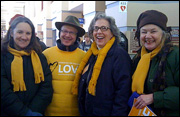Justice work earns award for Minnesota church
First Unitarian Universalist Church of Rochester, Minn., receives UUA’s Bennett Award.
First UU Church of Rochester was recognized for its renewed commitment to social justice work, with more than half its members engaged in service, witness, and advocacy efforts.
In announcing the award on June 14, Susan Leslie, the director of the UUA’s Office for Congregational Advocacy and Witness, said: “Your mission statement, ‘To be a Compassionate, Welcoming Community that Nurtures Spiritual Growth and Practices Justice,’ is clearly being practiced in the outstanding work you have done to stand on the side of love. Your participation in congregation-based community organizing . . . , your work for LGBT equality and racial justice, and your emphasis on interfaith efforts as well as working with your UU state networks are models for congregational service, education, advocacy, and witness.”
In 2006, First UU Church of Rochester saw the chance to revitalize its spiritual community when the time came to call a new minister to the congregation. As members clarified their values during the minister search process, they realized that they were not meeting their full potential in their commitment to social justice. They had many individual members engaged in social activism in the wider community, but as a congregation, they felt that there was room for improvement.
Members of the Social Justice Committee led a Social Justice Empowerment workshop in 2007. It was a chance for experienced congregants to share their knowledge and for all members of the church to identify issues that were important to them. “That workshop was something that really inspired our members and gave us direction,” said Gail Bishop, chair of the Social Justice Council.
At the workshop, 103 out of the 372 church members reviewed their current work and developed a vision for the future. The group identified a few specific areas of social justice to focus on and immediately formed task groups around issues of poverty, racism, health care, the environment, international justice, LGBT rights, and accessibility for people with disabilities.
What followed was a whirlwind of activity, as members of the church restructured their Social Justice Council into a single body of representatives from the various task groups. Each task group grew into its own entity, with its own budget and agenda. The Rev. Dr. Carol Hepokoski, the church’s minister since 2006, points to the creation of the task groups as one of the specific assets of their social justice program. “The strength of our program is in the diversity of opportunity that we offer,” said Hepokoski. “So people can be involved in service, in education, in witness, in advocacy, and now in community organizing.”
The congregants are living their values in the community, with members involved in toy and food drives, making the church accessible to people with disabilities, reducing the congregation’s carbon footprint, and many more activities. “It brings together people with a common passion, connects people in a different way, and you get this incredible enthusiasm,” said Bishop.
Hepokoski agreed. “They go hand in hand—our spirit of fellowship and our work in social justice. They reinforce each other,” Hepokoski said. She highlighted the importance of involving the community members as leaders, and the effect that has had on congregational involvement. “Our leadership is distributed throughout the congregation. It’s very exciting to see the widespread participation.”
Once the task groups were established, interest and involvement grew. Now, nearly half the congregation is involved in some sort of social justice, ranging from advocacy campaigns to partnership programs with local Habitat for Humanity groups. The entire congregation has affirmed a new congregational mission statement that guides the church: “To be a Compassionate, Welcoming Community that Nurtures Spiritual Growth and Practices Justice.”
The church members continue to find new ways to participate in social witness. A task group called the Standing on the Side of Love Rapid Response Team builds on the UUA’s existing campaign that calls for compassion in human relations, with a particular focus on marriage equality and immigrants’ rights. Bishop said the 45-member group is made up of people who are ready to respond quickly to events as they arise, but who aren’t necessarily committed to any one task group. The group did a test run at the Martin Luther King Jr., parade in February. “We marched with our yellow scarves. It really was quite visible,” Bishop said. “There was a lot of energy.”
Even though the group hasn’t been called to march since, Bishop emphasizes the importance of having the task group ready. “You can talk about things, but being present is part of witness and advocacy,” she said. “It helps us walk that talk.”
Both Bishop and Hepokoski envision a time, soon, when the rapid response team will be called to witness. In November 2011, voters in Minnesota will have the chance to vote on an amendment to the state’s constitution that would ban same-sex marriage. The church has decided, through a rigorous resolution process, to rally against the amendment.
“As a congregation, we are gaining confidence in our ability to engage with challenging and potentially divisive issues,” Hepokoski said. “And as we do this, we’re bringing our deepest values to life, both within our congregation and beyond our walls.”
The Bennett Award is accompanied by a $500 cash prize, which the church will use to further its work. “It’s an affirmation of the social justice program that we have been building over the past few years,” says Hepokoski. “We’re both humbled and thrilled.”
The Bennett Award for Congregational Action on Human Justice and Social Action was established in 1999 and is named for Dr. James R. Bennett, professor emeritus of the University of Arkansas and former director of the Gustavus Meyers Center of Human Rights in North America.
See sidebar for links to related resources.
Comments powered by Disqus







